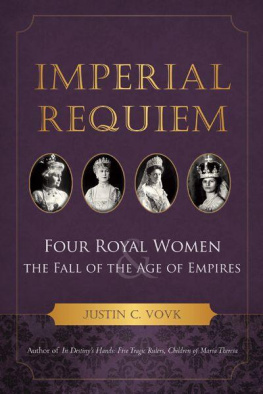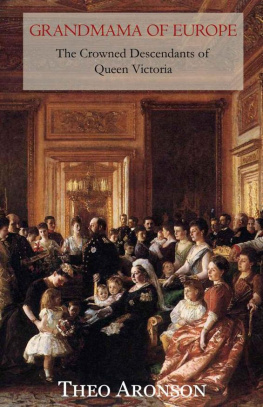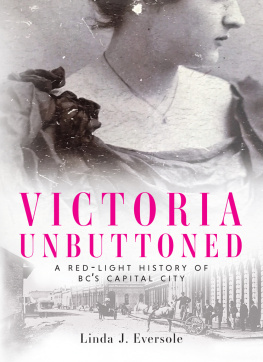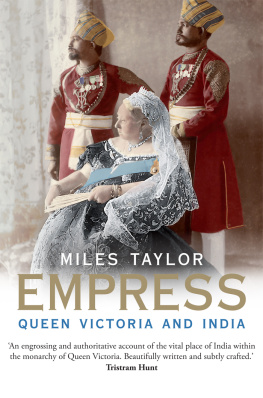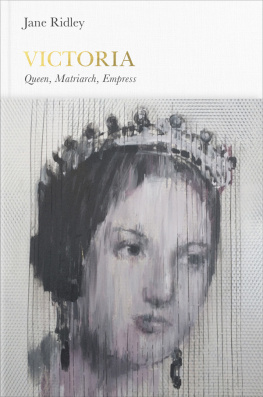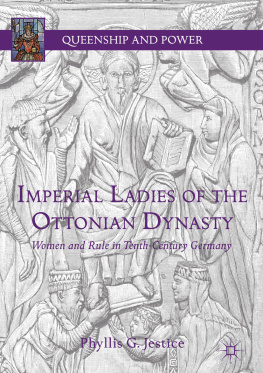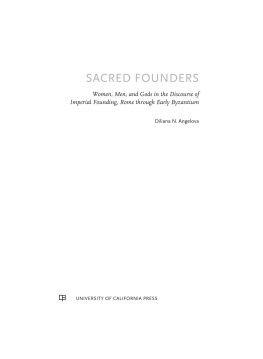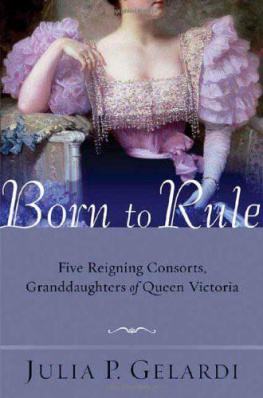Also by Justin C. Vovk
For my parents, without whom this book,
literally, would not exist.
Contents
I must take a moment to express my deepest thanks to all those who have helped me in writing Imperial Requiem . I have learned so much since writing In Destinys Hands that I would like to think that I have corrected many of the mistakes I made the first time around. Once again, I would like to thank Dr. Otto von Habsburg, whose insights, recollections, and memories have proved invaluable. I was deeply saddened by his death in July 2011, and regret that he was not able to see this book completed. In addition, the interviews both he and Empress Zita conducted with the journalist and historian Gordon Brook-Shepherd were treasure troves of information that I could never have dreamed of uncovering on my own.
For sharing his experiences and insights with me regarding the Prussian royal family and the House of Hohenzollern, I would like to thank Paul Rizo-Patron. His reminiscences provided from the grandchildren and great-grandchildren of Empress Augusta Victoria have proved crucial. I am also deeply indebted to the authors and historians Julia P. Gelardi and Helen Rappaport, whose expertise on Tsarina Alexandra and the Romanovs helped make Imperial Requiem what it is.
A word of heartfelt thanks goes out to my stalwart editor, Cherylyn Donaldson, whose loyalty and commitment are inspirational. Not every editor is willing to endure personal criticism for supporting authors, but she did. I am also grateful for her advice, both supportive and critical, in helping me flesh out a strong story that made sense. I am also indebted to Sara, my professional editor at the publishers, who provided tremendous assistance in unifying the style and voice of this book. Her attention to detail and the finer points in the book were vital. I am deeply indebted to my wonderful executive assistant, Diana Lozada, who not only made my burdens as light as possible, but also made working on this project with her a great joy and pleasure. Her professionalism, commitment, and encouragement were especially valued when this book was stalled by a family tragedy.
I owe a debt of gratitude to George Nedeff, my chief editorial consultant at iUniverse Publishing, who provided great counsel and direction, as well as tremendous patience with me when the process took much longer than expected. I also would like to thank the design and editing teams that spent so many long hours making Imperial Requiem the best it could possibly be. I would also like to thank Rebekka Potter for helping me smooth out the complex anscillary materials. To the staff of the numerous archives and university archives, a sincere thank-you for all your help. These include in Canada: the Mills Historical Library and Archives at McMaster University and the Scott Library at York University; in Germany: the Brandenburg-Preussisches Hausarchiv and the Langenburg Hausarchiv; in Austria: the Hausarchiv, Hofarchiv, and Staatsarchiv in Vienna; in the United Kingdom: the London Public Records Office and the Parliamentary Archives; and in Slovenia: the National Ethnographic Institute, the National Library, and the Kobarid War Memorial.
I would like to express my gratefulness to the staff at Indigo Books and Music. The staff at Home Office in Toronto has been crucial in getting my book into stores across Canada. Just as supportive have been my colleagues at Chapters Ancaster, whose commitment to my success has been ceaseless. The numbers of copies my colleagues have hand-sold have truly been touching. I would like to particularly thank LouAnne Disher, Kim Rochon, Lisa Belder, Michael Clemens, Laura Llewellyn, and Stephanie Seagrove.
A most heartfelt thank you goes out to my friends and family who have supported me throughout the entire writing process yet again. My friends have rallied around me with tremendous support and encouragement, especially during some of the more recent, difficult times. I am deeply grateful to Vanessa Rundle, Frank Borger, Steven LeClerc, Stefanyie Hamilton, Marc Murchison, Ryan Hashimoto, Lisa Wilson, Roberta Rayburn, Barbara Lancefield, Karen Corlis, Kim Doucette, Jeff Grivel, Christine Matthews, Cynthia Kay, Connor Prebianca, David Antunes, Beau Caza, Michael Van Arragon, and Barb Girvan. I thank my parents, Sharon and Stan Vovk, who supported me wholeheartedly the moment I told them I was writing another book. It would not be an understatement to say that Imperial Requiem would not exist without them. Many thanks belong to my brother and sister-in-law, Steven and Jolene; my aunts and uncles, Patricia and Andrew Price, Tom Vovk, Monika Vovk, and Roger and Patty West; as well as my immensely supportive cousinsnot limited to, but includingJessica, Caitlin, Andrea, Miha, Maja, Marko, Kristina, and Andreja. I also wish to thank my cousin Gaper, who has been one of my biggest fans since the day I put pen to paper; I suspect I owe my European following to his support. To each and every one of you who has stood by me all this time, you have my deepest thanks.






1. The Hessian children with Queen Victoria in mourning for their mother, 1879. Left to right : Ella, Victoria, Queen Victoria, Ernie, Irene, and Alix. 2. Princess May with her mother, the Duchess of Teck, and her brothers Dolly, Frank, and Alge, c. 1880. 3. Princess May of Teck, 1893. 4. Princess Alix and Tsarevitch Nicholas in a formal engagement photograph, 1894. 5. The Prussian royal family in 1896. Standing left to right: Crown Prince Willy, Victoria Louise, Dona, and Adalbert. Seated, left to right: Augustus Wilhelm, Joachim, Wilhelm II (with Oscar seated in front), and Eitel-Frederick. 6. The Hessian princesses, 1906. Left to right : Alexandra, Victoria, Ella, and Irene. 7. Dona and Wilhelm looking stately and dignified in a formal portrait, 1910. 8. Tsarina Alexandra in formal Russian court regalia. 9. Dona and her daughter, Princess Victoria Louise, riding through the streets of Berlin, 1911. 10. Zita and Charles on their wedding day, October 21, 1911. 11. The Russian imperial family in 1913. Left to right : Marie, Alexandra (with Alexei seated in front of her), Olga, Tatiana, Nicholas II, and Anastasia. 12. Mary, queen of England and empress of India, c. 1913. 13. Augusta Victoria, German empress and queen of Prussia, 1913. 14. Tsar Nicholas II and King George V, 1913. 15. Queen Mary with her daughter, Princess Mary, as a nurse during World War I. 16. Zita in her coronation robes as queen of Hungary, 1916. 17. Emperor Charles I of Austria, king of Hungary, 1917. 18. Dona in exile at Amerongen, 1921. 19. Queen Mary, c. 1930.

